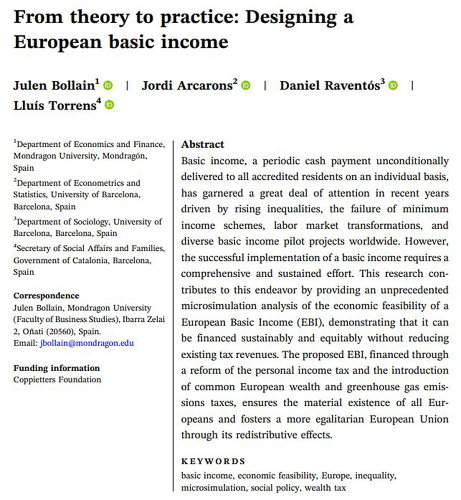A pioneering study has been published, providing the first comprehensive analysis of the financial feasibility of a European Basic Income (EBI). The research demonstrates that guaranteeing the right to existence for everyone in the European Union (EU) is not only economically viable but also promotes a more equitable and cohesive Europe.
Basic income—an unconditional, periodic cash payment to all individuals—has gained significant attention as a potential tool to address rising inequality, poverty, and labour market transformations. Despite increasing interest, no study until now has examined the financing of an EBI at the scale needed to ensure the material existence of all EU residents.
Key findings of the study:
- Eradication of poverty: The proposed EBI would eliminate poverty across the EU.
- Redistribution of wealth: The Gini index, a measure of inequality, would improve significantly from 0.3756 (pre-EBI) to 0.3000 (post-EBI).
- Benefit for the many: 63.2% of European households would see an improvement in their economic position, with the impact concentrated among the most vulnerable.
- Affordable cost: The total cost of the EBI is estimated at just 2.71% of the GDP of the EU-26.
The EBI would be financed through a combination of tax reforms, including adjustments to income tax, the introduction of a European wealth tax, and a greenhouse gas emissions tax. Crucially, the study demonstrates that these measures can fund the EBI sustainably without reducing existing tax revenues.
This research marks a critical step in proving that a European Basic Income is not only a utopian ideal but a realistic policy solution to create a fairer, more inclusive society. By addressing economic disparities and ensuring material security for all, a EBI could strengthen social cohesion and advance the European project.
The study also emphasizes that the redistribution achieved through the EBI would benefit the majority of the population while limiting losses to the wealthiest deciles, ensuring equity and fairness in its implementation.
About the study
The research was conducted by Julen Bollain, Jordi Arcarons, Daniel Raventós and Lluís Torrens and published in Poverty and Public Policy. It utilises a robust microsimulation model to analyse the financial and social impacts of the EBI, drawing on data from across the EU-26.
To read the full study, click here:
Correspondence: Julen Bollain, Mondragon University (Faculty of Business Studies), Ibarra Zelaia 2, Oñati (20560), Span. To send Julen an email, click here



Why EU 26? We have actually 27 member states.